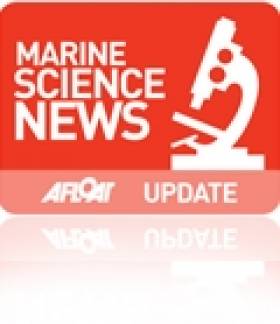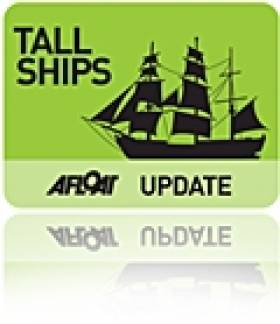Displaying items by tag: students
Students Showcased their Projects in the Marine Institute's Headquarters in Oranmore
Thirteen undergraduate students, participating in this year’s Marine Institute’s Summer Bursary programme, recently showcased their projects at a poster presentation day, held at the Marine Institute’s Headquarters in Oranmore.
The Bursars presented the outputs of their projects to the staff of the Marine Institute and answered questions about their project work. This year’s bursaries comprised a broad range of projects that are linked to the work undertaken by the Marine Institute. The project areas include Fisheries, Molecular Chemistry, Aquaculture, Marine Infrastructure Asset Management, Oceanographic analysis, Ocean Economics, Research Office, Human resources, Library and Marine Communications.
“The presentations showcased the diversity and high standard of work our bursary students are involved in,” said Helen McCormick, Bursar Programme Coordinator and Senior Laboratory Analyst at the Marine Institute.
A panel of judges, drawn from a range of Marine Institute staff, reviewed the posters, selecting three winners based on the student’s knowledge of their work, the presentation of their project information and their answers to a variety of questions.
Éabha Gaughan (NUI Galway) was awarded first place for her outstanding work on Human Resources Support which showcased her restructuring of the Marine Institute’s internal staff intranet using SharePoint software.
Éamonn-Joeín MacDonnachá (University College Cork) and Sara Ellis (NUI Galway) were both awarded second place for their creative work on analysing crayfish historic records and how they can be used as validation for the molecular detection of crayfish pathogens.
Hadia Mahmood (Munster Technological University) was awarded third place for her informative presentation on Ireland’s marine economy, in which she gathered data from various sectors and identified specific marine-related state investments.
“Each student showcased their work with energy and clarity and a great strength of the bursary scheme was to see students undertaking projects that were unrelated to their undergraduate degrees” said Dr Paul Connolly CEO of the Marine Institute. “Our Bursary scheme is a great introduction to the diversity of marine science and having undertaken four such bursaries many years ago, I am so proud to see the scheme continue to flourish.”
The Marine Institute Summer Bursary Programme has been running since the 1960s. A highly sought-after work experience programme in marine science, the programme continues to offer a promising gateway for students into the expanding world of marine science and research in Ireland.
The programme is aimed at undergraduates who have completed two years of study in a relevant discipline and is advertised on www.marine.ie in February each year. The scheme will continue in 2023.
#marinescience – The annual Marine Institute bursary programme gets underway this month (June, 2014) with 22 third-level students. Over eight weeks the students will work in a variety of areas including fish and shellfish assessments and surveys, sampling salmon and commercial fisheries in ports, maritime economics, oceanographic equipment modifications and communications.
"The student summer bursary programme has been ongoing since the 1960's and has great historical importance to the marine science sector. The work experience programme enables students from a wide variety of disciplines to further their knowledge and research in their particular area of interest and it offers the students to expand their professional networks within Ireland and abroad," explained Ms. Helen McCormick, Senior Laboratory Analyst at the Marine Institute and co-ordinator of the bursary programme for 2014.
The students will gain hands on experience at different locations around Ireland, including the offices and laboratories at the Marine Institute - Galway, Harcourt Street - Dublin and Burrishoole Catchment - Newport, County Mayo. Some students will also be located at fisheries ports in counties Cork, Waterford and Louth.
With the publication of "Harnessing Our Ocean Wealth" in July 2012, Ireland is expected to promote investment and enable growth within the marine sector. The bursary programme offers a promising gateway into the expanding areas of marine science and research in Ireland.
The programme is well recognised and aims to promote future employment opportunities for undergraduates and postgraduates. Dr Peter Heffernan, CEO of the Marine Institute congratulated all successful bursars on this years programme saying, "The Institute is delighted to support this excellent learning opportunity for Irish students".
Tall Ship Sail Training Open to All With Autumn Voyages
#TALL SHIPS - Sail Training Ireland for Youth Development (STIYD) has announced a golden opportunity for the general public to sail on a tall ship.
Hot on the heels of the Tall Ships Races visit to Dublin this August, a series of three tall ship voyages have been scheduled to take place to and from Irish ports by the UK-based Jubilee Sailing Trust (JST) on its 65-metre tall ship Tenacious between 11 October and 4 November 2012.
The first sailing from Southampton to Dublin (via Waterford) runs for 10 days from 11-20 October, followed by a seven-day jaunt from Dublin to Belfast from 22-28 October, and another seven-day trip from Belfast to Milford Haven from 29 October-4 November. Each voyage will have room for 40 trainees.
Anyone aged 16 and above can join the voyage crew as a trainee, and no previous experience is necessary.
Tenacious is also specially designed to cater for the needs of people with varying degrees of physical disability, including wheelchair users.
Features on board Tenacious and her sister ship Lord Nelson include signs in braille, lifts between decks, power assisted and 'joystick' steering, wide aisles and low-level fittings, guidance tracks and other on-deck pointers, and a speaking compass with digital screen.
STIYD says it is committed to providing access to tall ship sailing for the people of Ireland. The JST has also offered these voyages at a greatly reduced rate to encourage Irish trainees to get on board with what is hoped can become an annual event.
“It is great to see that the international tall ship fleet is reacting to recent activity in Irish sail training," said Michael Byrne, manager at STIYD. "Now that there is a central point of contact for trainees and vessel operators through STIYD, we can expect to see more and more of this kind of activity.
"When the JST approached us with a proposal to run their Irish Sea programme we offered our full support in promoting the opportunity. A unique and hugely important aspect to the JST is its ability to cater for people with varying degrees of physical ability.”
Kyle O’Regan of STIYD's youth branch added: “It is great for Irish trainees that the JST has arranged for Tenacious to have an Irish Sea programme. Being able to join or leave in your own country is a major advantage in terms of lowering costs.”
Meanwhile, the JST's Grainne Arntz said the charity has shown its "commitment to Ireland" by scheduling these autumn voyages.
"Three years ago we introduced the Ultimate Transition Year Tall Ship Adventure, a programme whereby groups of Transition Year students from Irish schools experience the challenge of tall ship sailing with diverse people.
"These voyages in the autumn will allow more groups and individuals to avail of the unique JST experience of sailing on a tall ship with people of all ages and abilities.”
The tall ship voyages are priced at £775 per person for the 10-day trip, and £525 per person for the seven-day excursions. To book your voyage with the JST visit their website HERE or call +44 23 8044 9108.
For information on the Irish branch of the Jubilee Sailing Trust visit www.jstireland.ie. For general information on sail training activities in Ireland contact Sail Training Ireland, Port Centre, Alexandra Road, Dublin 1 at 01 887 6046, e-mail [email protected] or visit www.irishsailtraining.com.
STIYD is the national sail training organisation for Ireland and is endorsed as such by Sail Training International. The vision of STIYD is to “provide access to the sail training experience for the people of Ireland”.






























































